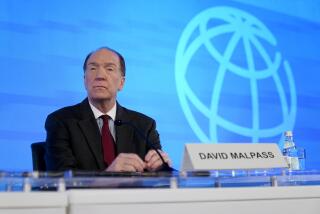World Bank: Hope and Obstacles
- Share via
New hope and high expectation have marked the installation of Barber B. Conable Jr. as president of the World Bank. His nomination by President Reagan was imaginative and constructive. He is an experienced and influential former member of the House of Representatives, a respected conservative in the authentic meaning of conservative. He comes to the presidency at a crucial moment as the bank becomes the key institution in facing the Third World debt crisis and in accelerating development in the poor nations of the world.
Paradoxically, however, the greatest obstacles in the path of this distinguished American are those erected by the American government. Even as Conable was being installed, Reagan was with-holding commitment of funds, agreed to by all the other major members, to enlarge the bank’s lending programs.
Until a year ago the bank was regarded by the Reagan Administration with suspicion. Every effort was made to freeze or shrink its operations until James A. Baker III succeeded Donald T. Regan as secretary of the Treasury. Now Baker has given the bank a central role in his plan to face the Third World debt-and-development crisis. But neither the Administration nor Congress has agreed to support the kind of funding implicit in that role.
In the months ahead there will be two particular tests of whether the American government is prepared to give the World Bank the support that it needs to implement its responsibilities:
--An eighth replenishment of the International Development Assn. is needed to finance the next three years of concessional loans to the poorest nations. All other contributors have agreed to a $12-billion replenishment. The U.S. Treasury Department has refused any commitment, but has said that it favors something between $10 billion and $12 billion. But Congress, with Gramm-Rudman pinching, is threatening cutbacks in the American payments for the previous replenishment, endangering the continuing program and casting a pall over future support.
--A doubling of the bank’s $67 billion in subscribed capital will be necessary within the next 12 months, in the view of most experts. But the U.S. government remains opposed, even though the amount of money would not be great. The pay-in by those pledging the capital is less than 10% of capital. The pledge is, in effect, a guarantee. The bank obtains most of its money through borrowing private capital.
This financial reluctance on the part of the United States could handicap the bank at a moment when it is shifting its loan policy to encourage structural reforms that are more likely to improve development programs. Curiously, that shift of emphasis has been one urged by the Reagan Administration because one of the crucial elements is to enlarge the role of the private sector and of free-market influences in Third World nations. In the fiscal year ending July 1, these reform-oriented loans accounted for 19% of all World Bank loans, up from 11% the year before. Concessional lending in Africa alone has seen these structural and sectoral reform loans more than double in the last three years.
A survey of World Bank problems by the Overseas Development Council last month concluded that there is an extraordinary opportunity for progress on both debt and development matters under the Conable presidency at the World Bank. But this requires increased resources and commitment by all donor nations--above all by the largest, the United States.
A failure to support a new leadership role for the World Bank at this time would be particularly shortsighted for the United States, which has more to lose, in terms of Third World debt, and more to gain, in terms of Third World trade, than any other nation.
More to Read
Sign up for Essential California
The most important California stories and recommendations in your inbox every morning.
You may occasionally receive promotional content from the Los Angeles Times.













